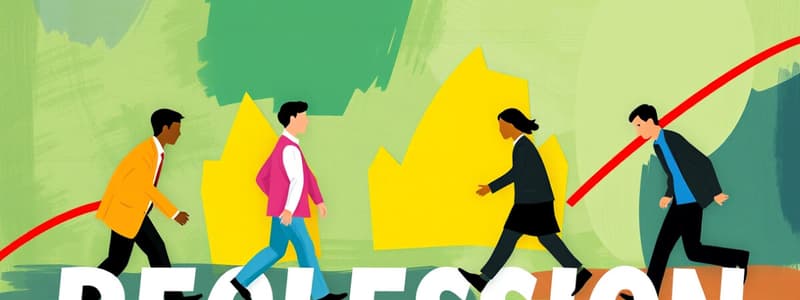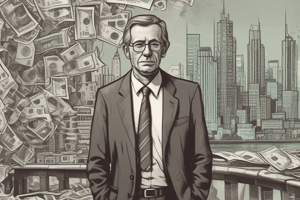Podcast
Questions and Answers
Which factor is NOT typically associated with causing a recession?
Which factor is NOT typically associated with causing a recession?
- Rising Interest Rates
- High Inflation
- Increase in Government Spending (correct)
- Decrease in Consumer Confidence
What impact can a recession have on youth employment rates?
What impact can a recession have on youth employment rates?
- Youth unemployment rates generally decrease.
- Youth unemployment rates may increase. (correct)
- Youth are less vulnerable to job losses.
- Youth always maintain their positions during economic downturns.
Which government response aims to stimulate the economy by providing direct financial support to businesses?
Which government response aims to stimulate the economy by providing direct financial support to businesses?
- Bailouts and Support Programs (correct)
- Unemployment Benefits
- Monetary Policy Adjustments
- Tax Relief
What was a major cause of the Great Recession (2007-2009)?
What was a major cause of the Great Recession (2007-2009)?
Which of the following is a likely long-term effect of prolonged unemployment during a recession?
Which of the following is a likely long-term effect of prolonged unemployment during a recession?
What economic challenge is primarily associated with supply chain disruptions during a recession?
What economic challenge is primarily associated with supply chain disruptions during a recession?
During which historical recession did tight monetary policies primarily result in significant job losses?
During which historical recession did tight monetary policies primarily result in significant job losses?
Which government response involves lowering interest rates to encourage spending?
Which government response involves lowering interest rates to encourage spending?
Flashcards are hidden until you start studying
Study Notes
Causes of Recession
- Decrease in Consumer Confidence: Reduced spending leads to lower demand for goods and services.
- High Inflation: Rising prices erode purchasing power, prompting consumers to cut back on spending.
- Rising Interest Rates: Higher borrowing costs discourage investments and consumer spending.
- Supply Chain Disruptions: Issues in production and distribution can lead to shortages and increased costs.
- Financial Crises: Bank failures or stock market crashes can lead to reduced lending and consumer confidence.
- Government Policies: Policy changes, such as austerity measures or tax increases, can dampen economic activity.
Effects on Unemployment
- Job Losses: Companies may lay off workers or freeze hiring due to decreased revenue.
- Long-term Unemployment: Prolonged recessions can lead to skills erosion, making it harder for individuals to find new jobs.
- Increased Part-time Work: Full-time positions may be replaced with part-time or temporary work as businesses seek to cut costs.
- Sector-Specific Impacts: Certain industries, like manufacturing and retail, may experience higher unemployment rates than others.
- Youth Unemployment: Younger workers are often more vulnerable to job losses during recessions, leading to higher youth unemployment rates.
Government Responses
- Monetary Policy Adjustments: Central banks may lower interest rates to stimulate borrowing and investment.
- Fiscal Stimulus: Increased government spending on infrastructure, education, or healthcare to boost demand.
- Unemployment Benefits: Expanding benefits to support unemployed individuals and sustain consumer spending.
- Tax Relief: Temporary tax cuts to increase disposable income for consumers and businesses.
- Bailouts and Support Programs: Financial assistance for struggling industries to avoid massive job losses and stabilize the economy.
Historical Recessions
- Great Depression (1929-1939): Severe worldwide economic downturn marked by high unemployment and deflation.
- Recession of 1981-1982: Triggered by tight monetary policies to combat inflation; led to significant job losses.
- Dot-com Bubble Burst (2000-2001): Economic decline stemming from the collapse of tech stocks, leading to a recession.
- Great Recession (2007-2009): Resulted from a housing market crash and financial crisis, with widespread economic and employment impacts.
- COVID-19 Recession (2020): Sharp economic decline due to the pandemic, leading to unprecedented unemployment rates and government intervention.
Causes of Recession
- Decreased consumer confidence results in reduced spending, lowering overall demand for goods and services.
- High inflation diminishes purchasing power, causing consumers to restrict their spending activities.
- Rising interest rates increase borrowing costs, discouraging both investments and consumer expenditures.
- Supply chain disruptions hinder production and distribution, leading to shortages and elevated costs for consumers.
- Financial crises, such as bank failures or stock market crashes, can diminish lending and erode consumer confidence.
- Government policies, including austerity measures or tax hikes, can negatively impact economic growth and activity.
Effects on Unemployment
- Job losses are common as companies may reduce staffing levels or halt hiring in response to declining revenues.
- Long-term unemployment can occur, with prolonged recessions leading to skills erosion among workers, complicating re-employment efforts.
- Increased part-time work may substitute for full-time positions, as businesses aim to cut costs during economic downturns.
- Specific sectors, particularly manufacturing and retail, may suffer disproportionately high unemployment rates compared to others.
- Younger workers typically experience a higher vulnerability to job losses during recessions, resulting in elevated youth unemployment levels.
Government Responses
- Central banks may lower interest rates as part of monetary policy adjustments to encourage borrowing and investment.
- Fiscal stimulus can involve increased government spending on infrastructure, education, and healthcare, designed to enhance economic demand.
- Expanded unemployment benefits can support individuals out of work and help maintain consumer spending levels.
- Temporary tax relief measures can increase disposable income for consumers and small businesses, promoting economic activity.
- Bailouts and support programs aim to provide financial assistance to struggling industries, preventing significant job losses and stabilizing the economy.
Historical Recessions
- The Great Depression (1929-1939) represented a drastic global economic decline characterized by extreme unemployment and deflationary pressures.
- The recession of 1981-1982 was precipitated by stringent monetary policies implemented to combat rampant inflation, leading to extensive job losses.
- The Dot-com Bubble Burst (2000-2001) resulted in an economic downturn caused by the collapse of technology stocks, which subsequently triggered a recession.
- The Great Recession (2007-2009) followed a crash in the housing market and financial crisis, impacting economies worldwide with severe employment fallout.
- The COVID-19 Recession (2020) caused a rapid economic decline amid the pandemic, resulting in historically high unemployment rates and significant government interventions.
Studying That Suits You
Use AI to generate personalized quizzes and flashcards to suit your learning preferences.




